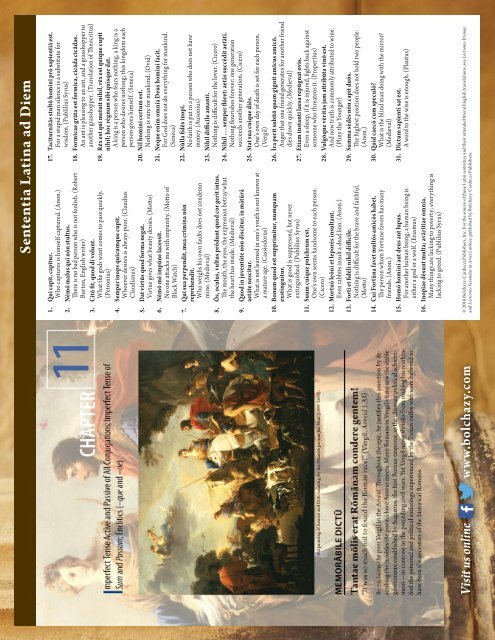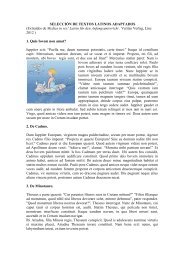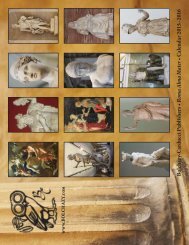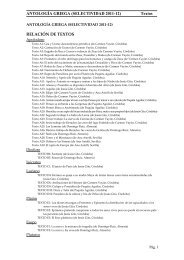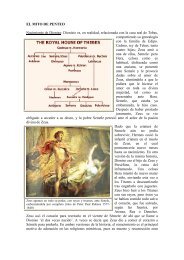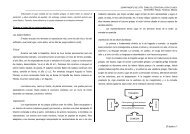www.BOLCHAZY.com
2016-2017RomanCalendar
2016-2017RomanCalendar
You also want an ePaper? Increase the reach of your titles
YUMPU automatically turns print PDFs into web optimized ePapers that Google loves.
Visit us online<br />
<strong>www</strong>.bolchazy.<strong>com</strong><br />
Sententia Latina ad Diem<br />
1. Quī capit, capitur.<br />
Who captures is himself captured. (Anon.)<br />
2. Nēmō malus quī nōn stultus.<br />
There is no bad person who is not foolish. (Robert<br />
Burton, English writer)<br />
3. Citō fit, quod dī volunt.<br />
What the gods want <strong>com</strong>es to pass quickly.<br />
(Petronius)<br />
4. Semper inops quīcumque cupit.<br />
Whoever desires is always poor. (Claudius<br />
Claudianus)<br />
5. Dat virtūs quod forma negat.<br />
Virtue gives what beauty denies. (Motto)<br />
6. Nēmō mē impūne lacessit.<br />
No one attacks me with impunity. (Motto of<br />
Black Watch)<br />
7. Quī sua perpendit, mea crīmina nōn<br />
reprehendit.<br />
Who weighs his own faults does not condemn<br />
mine. (Medieval)<br />
8. Ōs, oculus, vultus prōdunt quod cor gerit intus.<br />
The mouth, the eyes, the expression betray what<br />
the heart has inside. (Medieval)<br />
9. Quod in juventūte nōn discitur, in mātūrā<br />
aetāte nescītur.<br />
What is not learned in one’s youth is not known at<br />
a mature age. (Cassiodorus)<br />
10. Bonum quod est supprimitur, numquam<br />
exstinguitur.<br />
What is good is suppressed, but never<br />
extinguished. (Publilius Syrus)<br />
11. Suum cuique pulchrum est.<br />
One’s own seems handsome to each person.<br />
(Cicero)<br />
12. Mortuō leōnī et leporēs īnsultant.<br />
Even rabbits insult a dead lion. (Anon.)<br />
13. Fortī et fidēlī nihil difficile.<br />
Nothing is difficult for the brave and faithful.<br />
(Motto)<br />
14. Cui Fortūna favet multōs amīcōs habet.<br />
The person whom Fortune favors has many<br />
friends. (Anon.)<br />
15. Homō hominī aut deus aut lupus.<br />
For another human being, a human being is<br />
either a god or a wolf. (Erasmus)<br />
16. Inopiae dēsunt multa; avāritiae omnia.<br />
Many things are lacking to poverty; everything is<br />
lacking to greed. (Publilius Syrus)<br />
17. Taciturnitās stultō hominī prō sapientiā est.<br />
For a stupid man silence is a substitute for<br />
wisdom. (Publilius Syrus)<br />
18. Formīcae grāta est formīca, cicāda cicādae.<br />
An ant is pleasing to an ant, and a grasshopper to<br />
another grasshopper. (Translation of Theocritus)<br />
19. Rēx est quī metuit nihil, rēx est quīque cupit<br />
nihil; hoc rēgnum sibi quisque dat.<br />
A king is a person who fears nothing, a king is a<br />
person who desires nothing; this kingdom each<br />
person gives himself. (Seneca)<br />
20. Nīl hominī certum est.<br />
Nothing is sure for mankind. (Ovid)<br />
21. Neque enim omnia Deus hominī facit.<br />
For God does not do everything for mankind.<br />
(Seneca)<br />
22. Nūlla fidēs inopī.<br />
No faith is put in a person who does not have<br />
money. (Ausonius)<br />
23. Nihil difficile amantī.<br />
Nothing is difficult for the lover. (Cicero)<br />
24. Nihil . . . semper flōret: aetās succēdit aetātī.<br />
Nothing flourishes forever: one generation<br />
succeeds another generation. (Cicero)<br />
25. Stat sua cuique diēs.<br />
One’s own day of death is set for each person.<br />
(Vergil)<br />
26. Īra perit subitō quam gignit amīcus amīcō.<br />
Anger that one friend generates for another friend<br />
dies down quickly. (Medieval)<br />
27. Etiam īnstantī laesa repūgnat ovis.<br />
Even a sheep, if it is injured, fights back against<br />
someone who threatens it. (Propertius)<br />
28. Vulgōque vēritās jam attribūta vīnō est.<br />
And now truth is <strong>com</strong>monly attributed to wine.<br />
(Pliny the Younger)<br />
29. Summa sēdēs nōn capit duōs.<br />
The highest position does not hold two people.<br />
(Anon.)<br />
30. Quid caecō cum speculō?<br />
What is the blind man doing with the mirror?<br />
(Medieval)<br />
31. Dictum sapientī sat est.<br />
A word to the wise is enough. (Plautus)<br />
© 2016 Bolchazy-Carducci Publishers, Inc. For the source of these Latin sententiae and their intended literal English translations, see Lectiones Primae<br />
and Lectiones Secundae in Artes Latinae, published by Bolchazy-Carducci Publishers.


